Stefania Oppido
CNR – Istituto di Ricerca su Innovazione e Servizi per lo Sviluppo
stefania.oppido@cnr.it
Vedi anche:
Resilience - Innovation - Sustainable Development | Transparency – Organization – Meritocracy
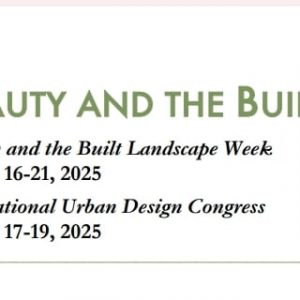
The “Beauty and the Built Landscape Week”, to be held in Viterbo, Italy, on June 16-21, 2025, aims to foster discussions on the role of beauty in urban design. The event will explore how aesthetic quality can contribute to human well-being, sustainability, and the design of livable cities. The congress, planned to be held on June 17-19, seeks to address the contemporary challenges of urban aesthetics by integrating perspectives from history, culture, environmental psychology, and design theory. It also aims to reconcile the functional and environmental aspects of urban planning with the traditional goal of creating beautiful and hospitable living environments. Five sessions are scheduled focusing on the following topics:
Sessions
Session 1: The Watermarks of Beauty
Coordinated by: Mark Alan Hewitt, Mark Alan Hewitt Architects; Steven W. Semes, University of Notre Dame, Board of Directors, BBL
What are we talking about when we talk of beauty in urban landscapes? What are its characteristics and where does it come from? Are there different types? Is it generally the product of single artists or of collective involvement? Is it innate and culturally universal or the property of diverse cultures? We begin with a brief overview of some central questions.
Session 2: Beauty and Organized Complexity
Coordinated by: Stefano Cozzolino, Research Institute for Regional and Urban Development, Dortmund, Scientific Committee, BBL; Stefano Moroni, Politecnico di Milano, Board of Directors, BBL
Urban beauty has traditionally been thought to be “a work of art”. However, authors engaging with complexity theories, such as Jane Jacobs and Christopher Alexander, have challenged this assumption, emphasising the generative power of urban life and emergent living structures. Where does the contemporary debate stand today?
Session 3: Inhabiting Beauty: Urban and Social Aspects of Environmental Aesthetic Quality
Coordinated by: Claudia Mattogno, Chair, Scientific Committee, BBL; Marichela Sepe, Coordinator GUD, Sapienza Università di Roma, Board of Directors, BBL
By focusing on the role of beauty in the design and experience of public spaces, the session will explore how elements such as form, materials, textures, and colours shape the way people perceive and interact with their surroundings. Participants are encouraged to consider how beauty can elevate the functionality of public spaces, fostering a sense of belonging and shared purpose while promoting active and inclusive engagement with urban life. Both theoretical and empirical contributions are welcomed.
Session 4: Beauty and Culture: Lifestyle, Building Types, Historical Towns and Vernacular Architecture
Coordinated by: W.w. Dīng, Nanjing University, ISUF, Director, Urban Design Dept for Historical and Cultural City Committee, Chinese Society of Urban Studies, Board of Directors, BBL; Jǐnxī Ch.n, Tsinghua University, Scientific Committee, BBL
Beauty and culture are inseparable in determining the aesthetic qualities of cities. There is no absolute beauty, and different cultures create the beauty of different cities. The aesthetic quality of historic centres, traditional and vernacular settlements, cases and methods of regeneration are discussed with a cosmopolitan attitude.
Session 5: Beauty and Liberty
Coordinated by: Stefano Cozzolino, Research Institute for Regional and Urban Development, Dortmund, Scientific Committee, BBL; Stefano Moroni, Politecnico di Milano, Board of Directors, BBL
Harmony and order are two conceptual pillars of beauty, often operationalised through stringent, highly prescriptive regulatory frameworks that can stifle individual design creativity and freedom. As observed by Marco Romano, among others, this approach can have significant negative repercussions. What should the role of regulation be?
In addition to the congress, the BBL week will feature exhibitions, films, and tours in historic sites of Viterbo and its surroundings.
The congress welcomes both theoretical and design contributions focusing on the intersection of beauty and urban design. Participants will be selected based on the relevance of their contributions to:
Participation:
The congress seeks to encourage an interdisciplinary approach, welcoming contributions from aesthetics, urban morphology, phenomenology, experimental psychology, and design strategies that explicitly address urban beauty.
Download the Call for participation
March 17th, 2025
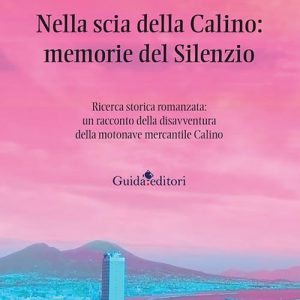
Il volume Nella scia della Calino: memorie del Silenzio (Guida Editori) di Giovanni Di Trapani, Ricercatore del Cnr Iriss, è il risultato di un’attenta ricerca storica che si muove tra documenti d’archivio, testimonianze orali e fonti indirette per ricostruire il destino della Calino, una nave il cui passato si intreccia con le grandi vicende del Novecento. Entrata in servizio nella primavera del 1940 con la società di navigazione Adriatica, il 10 ottobre 1940 la Calino viene requisita dalla Regia Marina a Venezia per essere impiegata come nave da trasporto di merci, rifornimenti e truppe. La Calino rappresentava l’ambizione fascista di modernizzare la flotta mercantile italiana, ma la guerra ne stravolse il destino, trasformandola da nave passeggeri a strumento militare.
Attraverso un’indagine che si sviluppa tra biblioteche, archivi navali e racconti familiari, il libro restituisce un quadro dettagliato della memoria storica legata agli uomini e alle donne che vissero l’esperienza della nave, spesso nell’ombra della Storia ufficiale.
Il volume si inserisce in una più ampia riflessione sul ruolo della memoria e della trasmissione del passato, adottando un approccio interdisciplinare che combina ricerca archivistica, analisi delle fonti e narrazione letteraria. L’autore conduce il lettore lungo un percorso che intreccia il vissuto personale con la ricostruzione storica, mettendo in luce le lacune della documentazione ufficiale e il valore delle fonti orali nel processo di riscoperta della verità storica.
La Calino diventa così simbolo di un’indagine che va oltre il dato materiale, per interrogarsi sul significato del silenzio, della dimenticanza e del recupero delle radici. Con un approccio rigoroso ma al tempo stesso narrativo, il libro dimostra come il passato possa emergere nei dettagli più inaspettati, nei racconti tramandati, nelle tracce lasciate nel paesaggio e nelle carte ingiallite del tempo.
Una lettura che si rivolge non solo agli appassionati di storia e ricerca documentaria, ma anche a chi si interroga sul rapporto tra memoria, identità e narrazione.
Eventi di presentazione
Per informazioni:
Giovanni Di Trapani
CNR – Istituto di Ricerca su Innovazione e Servizi per lo Sviluppo
giovanni.ditrapani@cnr.it
Vedi anche:
March 6th, 2025
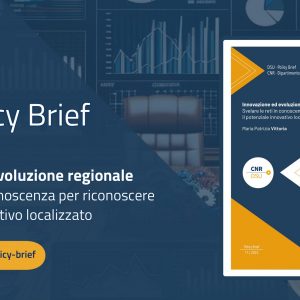
Le reti in conoscenza possono essere considerate come nuove istituzioni economiche per l’analisi dei contesti innovativi. Tali istituzioni avrebbero il ruolo di organizzare i processi di creazione e diffusione dei flussi di informazioni e conoscenze tra gli attori di un contesto produttivo. A partire da questo riconoscimento, una maggiore attenzione è stata rivolta alle tecniche per il disvelamento di queste reti, alle modalità per riconoscere, al loro interno, le densità corrispondenti ai poli più dinamici nel circuito di creazione e diffusione delle conoscenze.
Focalizzando l’attenzione sul contesto industriale della regione Campania, si può osservare quanto esso sia severamente esposto alle contraddizioni evidenziate dal cosiddetto paradosso dell’innovazione, ovvero da situazioni in cui al forte bisogno di innovazione, non corrisponde la pari capacità di assorbire le risorse pubbliche stanziate per ottenerla.
Allo scopo di dimostrare l’importanza strategica di una diagnostica effettuata con l’analisi di rete, in questo contesto, forniremo le evidenze emerse da alcune ricerche condotte tra il 2014 e il 2024 ed indirizzate ad effettuare analisi esplorative del potenziale innovativo della regione Campania. Si vedrà che, nei settori ad alta intensità di conoscenze, come il biotecnologico o anche nelle produzioni culturali e creative, le linee di dialogo tra gli attori disegneranno griglie di rete entro le quali sarà più agevole individuare il bisogno di innovazione.
Il presente policy brief intende segnalare l’importanza dell’analisi di rete con approccio strategico-evolutivo, per la definizione di politiche per l’innovazione efficaci, essendo capace di fornire uno sguardo completo sulle capacità innovative localizzate.
Vittoria, M. P. (2025). Innovazione ed evoluzione regionale. Svelare le reti in conoscenza per riconoscere il potenziale innovativo localizzato (DSU Policy brief 11). CNR-Dipartimento di Scienze Umane e Sociali, Patrimonio culturale. https://doi.org/10.36134/PBDSU-2025-11.
March 5th, 2025
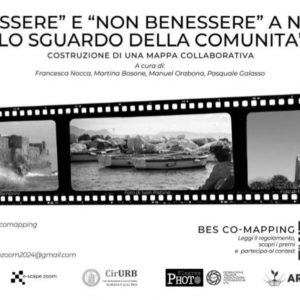
Il progetto “’Benessere’ e ‘Non-Benessere’ a Napoli: lo sguardo della comunità. Costruzione di una mappa collaborativa” organizzato da Francesca Nocca, Martina Bosone, Manuel Orabona e Pasquale Galasso (Dipartimento di Architettura Unina, Associazione ARPSESS) ha un duplice obiettivo: costruire una mappa collaborativa della città di Napoli per scoprire i fattori che la comunità associa a condizioni di ‘benessere’ e ‘non-benessere’ nello spazio urbano (nonché quali elementi influenzano maggiormente la percezione di tali condizioni) e stimolare il dialogo tra diversi stakeholder sul tema della qualità della vita nella città di Napoli.
Partendo dalla definizione di Benessere Equo e Sostenibile (BES) dell’ISTAT, secondo cui il benessere è un concetto multidimensionale legato a 12 fattori (“domini”: Salute, Istruzione e Formazione, Lavoro e Conciliazione dei Tempi di Vita, Benessere Economico, Relazioni Sociali, Politica e Istituzioni, Sicurezza, Benessere Soggettivo, Paesaggio e Patrimonio Culturale, Ambiente, Innovazione, Ricerca e Creatività, Qualità dei servizi) che influenzano la percezione del benessere delle persone (e quindi la loro qualità della vita), il gruppo di ricerca intende esaminare questa tematica attraverso diversi strumenti e approcci che coinvolgono la comunità.
Il primo strumento di indagine utilizzato per la sperimentazione è quello della fotografia attraverso la quale la comunità è invitata a “catturare” luoghi urbani e scene di vita quotidiana che siano rappresentativi del ‘benessere’ e ‘non-benessere’ a Napoli. La fotografia è solo il primo degli strumenti che saranno utilizzati per l’indagine in quanto il progetto ha l’obiettivo di coinvolgere un ventaglio di stakeholder sempre maggiore e diversificato. A tal fine, è stato lanciato un primo contest fotografico gestito attraverso uno strumento online che consente di geolocalizzare i dati e restituire una rappresentazione spaziale delle percezioni della comunità rispetto alle condizioni di ‘benessere’ e ‘non benessere’ nello spazio urbano. Le fotografie raccolte attraverso il contest saranno oggetto di un processo di valutazione finalizzato a fornire informazioni e dati utili alla conoscenza della città attraverso lo sguardo delle persone che la vivono. I dati e le informazioni dedotte e sistematizzate secondo una metodologia scientifica possono rappresentare un utile strumento di supporto all’elaborazione di strategie di sviluppo sostenibile per il miglioramento della qualità della vita delle persone e per facilitare il dialogo tra diverse categorie di stakeholder.
L’iniziativa ha avuto il patrocinio dell’Ordine degli Architetti di Napoli, del Centro Interdipartimentale di Ricerca in Urbanistica Alberto Calza Bini (Dipartimento di Architettura, Unina), dell’Associazione Flegrea PHOTO e dell’Associazione per la Ricerca e Promozione dello Sviluppo Equo, Sostenibile e Solidale (ARPSESS)
Per ulteriori informazioni consultare il link: https://linkbio.co/61015142IWooZ?fbclid=PAZXh0bgNhZW0CMTEAAaZvQEQMkI68BLV-24lB3TCbfvXS1TpXPbUM3mDENxZJaqTz1_0YfSjJH7A_aem_JnV1QbosRp9SSsrXzclBxA
Per partecipare al contest: https://survey123.arcgis.com/share/bafd60a0364d46a1ae507b0d5fbb3fa7?fbclid=PAY2xjawIpaQpleHRuA2FlbQIxMAABpt5sKKi77eDKG3vfrFwY_vzE6-FG244K0ltpl8osnkLkFRlawdLI-dN1kg_aem_IkRKhWsclVO1PD9R-y2juQ
Tutti gli aggiornamenti sono disponibili anche sulla pagina instagram dedicata: @bes_comapping
February 25th, 2025
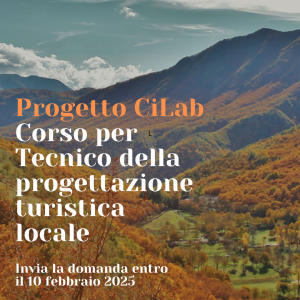
Il Corso di Formazione per “Tecnico della progettazione turistica locale” si inquadra nell’ambito del progetto Monti Picentini CiLab – Il Parco Regionale dei Monti Picentini in cammino per un Parco Circolare, finanziato dal GAL AISL (Irpinia Sannio – Cilsi), Misura 7 Tipologia di Intervento 7.6.1– PSR Campania 2014-2020. Il progetto si inserisce nelle attività di ricerca e di terza missione sviluppate al Cnr Iriss sul tema delle aree interne per contribuire al dibattito scientifico e culturale e all’attivazione di processi collaborativi di rigenerazione e di riduzione delle disuguaglianze territoriali attraverso iniziative di engagement e co-design con attori territoriali.
L’iniziativa rappresenta un’opportunità per perseguire gli obiettivi definiti attraverso un Accordo quadro per attività di collaborazione scientifica e di supporto alla didattica tra il Cnr Iriss, il Dipartimento di Architettura dell’Università degli Studi di Napoli “Federico II” (DiARC), l’Ente Parco Regionale dei Monti Picentini e l’Ente Riserve Naturali “Foce Sele Tanagro” e “Monti Eremita Marzano”.
Un percorso di attivazione di sinergie ed alleanze tra ricercatori e attori locali in un territorio interno della Regione Campania, un processo incrementale di empowerment di comunità e di capacity building finalizzato a produrre innovazione sociale, culturale ed economica in contesti marginalizzati: in questa prospettiva, le ricercatrici Stefania Oppido e Stefania Ragozino hanno assunto la responsabilità scientifica per il Cnr Iriss e le professoresse Maria Cerreta (associato del Cnr Iriss) e Katia Fabbricatti per il DiARC, con l’obiettivo di promuovere una proficua interazione tra saperi scientifici e saperi locali per la valorizzazione delle risorse territoriali.
Nello specifico, il corso di formazione mira al potenziamento ed alla valorizzazione delle aree naturali protette attraverso azioni di conoscenza e sensibilizzazione. L’attività formativa prevede di potenziare le competenze professionali dei partecipanti alternando elementi di teoria, con project-work e attività sul campo, attraverso metodologie di insegnamento, non solo frontali, che favoriscano lo sviluppo del pensiero creativo e delle competenze tecniche accanto alle attitudini manageriali e di leadership.
Le persone interessate in possesso dei requisiti richiesti potranno iscriversi presentando la domanda di partecipazione ed il proprio CV (datato e firmato) alla mail: avellino@tmconsulting.work specificando come oggetto della mail: “SEMINARIO FORMATIVO TECNICO DELLA PROGETTAZIONE TURISTICA LOCALE” – entro e non oltre le ore 12.00 del giorno 10 febbraio 2025.
Vedi anche:
February 6th, 2025
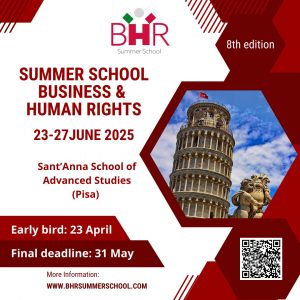
The BHR Summer School is an advanced and intensive educational training program targeted at students, academics, and professionals (e.g. legal practitioners, consultants, NGOs’ personnel) aiming to further their knowledge of the most significant developments in the field of Business & Human Rights while keeping up with current relevant developments at national, regional and international level. To this aim it follows a smart-mix approach, composed of theoretical and practical classes as well as forums given by lecturers with different backgrounds, including academics, NGOs, lawyers, corporations, consultants, public institutions’ officers. The School is the outcome of the scientific partnership between Cnr Iriss, the University of Milan, the Wagenigen Universtity and Research, and Human Rights International Corner NGO.
Structure and Contents
The Summer School’s sessions are spread over four-and-a-half days. Each day is composed of 6 hours of lessons with a lunch break of 1 hour. The Summer School is divided into sessions that focus on a variety of topics, such as:
The course programme will be published soon.
Applications must be submitted by May 31st 2025 (early bird April 23 2025).
The Scientific Committee of the BHR Summer School is composed of Angelica Bonfanti (University of Milan), Marta Bordignon (Human Rights International Corner), Marco Fasciglione (National Research Council of Italy), Chiara Macchi (Wageningen University) and Giuseppe Di Vetta (Sant’Anna School).
For more information
Marco Fasciglione, PI of the project CO.RE. Corporate Human Rights and Environmental Due Diligence and the Promotion of the Corporate Responsibility, marco.fasciglione@cnr.it
Per informazioni:
Marco Fasciglione
CNR – Istituto di Ricerca su Innovazione e Servizi per lo Sviluppo
marco.fasciglione@cnr.it
Vedi anche:
January 27th, 2025
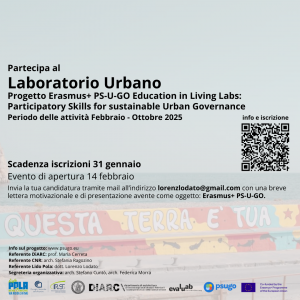
Da febbraio ad ottobre 2025 sarà implementato l’Urban Living Lab Naples (ULL Naples) del progetto Erasmus+ PS-U-GO “Education in Living Labs: Participatory Skills for sustainable Urban Governance“, finalizzato ad un processo di riappropriazione, democratizzazione e restituzione del mare alla città. L’ULL Naples si svolge in continuità con il processo di ricerca-azione sviluppato da Cnr Iriss in collaborazione con il Lido Pola – Bene Comune per l’attivazione di processi di rigenerazione urbana nel quartiere di Bagnoli e con il Convegno Internazionale AESOP Urban Conflicts and Peace: Everyday Politics of Commons co-organizzato da Cnr Iriss e ospitato dal Dipartimento di Architettura (DiARC) dell’Università degli Studi di Napoli Federico II e dal Lido Pola – Bene Comune.
Il progetto PS-U-GO, di durata triennale (gennaio 2024 – dicembre 2026), si propone di implementare 4 Urban Living Lab, intesi come spazi educativi, che coinvolgeranno gli attori della quadrupla elica – impresa, ricerca, istituzioni pubbliche e civiche – per esplorare, co-progettare e testare idee e soluzioni alle più urgenti sfide urbane. I quattro ULL saranno sviluppati nelle quattro città europee di Cottbus (Germania), Napoli, Palermo (Italia), Nicosia (Cipro). L’obiettivo di PS-U-GO è duplice: da un lato, promuovere una partecipazione attiva delle comunità locali per una governance urbana sostenibile e innovativa; dall’altra, consentire agli studenti e alle studentesse e agli altri attori coinvolti nel progetto di sviluppare competenze avanzate nella progettazione urbana e nella partecipazione civica attraverso modelli educativi innovativi sviluppati in contesti reali sfidanti.
L’ULL Naples si propone di contribuire al processo di riappropriazione e restituzione del mare di Napoli alla città in continuità con le attività sviluppate dal Comitato Mare Libero, Pulito e Gratuito di Napoli, attraverso la sperimentazione del modello di gestione collettiva dei Beni Comuni Urbani Napoletani, attivando un processo di conoscenza, partecipazione e azione collettiva che attraverserà gli spazi e le esperienze del Lido Pola Bene Comune. Gli studenti e le studentesse saranno coinvolti/e nella sistematizzazione nella mappatura dei livelli di accessibilità della costa napoletana già avviato dal Comitato Mare Libero, Pulito e Gratuito, nella definizione di azioni, strumenti e metodi per implementare il processo di riappropriazione della risorsa mare, nella preparazione del Training Event Napoli (aprile 2025) e di un evento pubblico conclusivo, e nelle attività periodiche di monitoraggio e valutazione. L’ULL si svilupperà attraverso attività seminariali, mobile workshop, attività di mappatura collaborativa, workshop di co-design e co-creazione sviluppate in tandem con gli ULL Cottbus, Palermo e Nicosia. Le attività del laboratorio si svolgeranno a Napoli presso il Lido Pola – Bene Comune (via Nisida n. 24), il Centro Giovanile Peppino Impastato (via Cicerone n. 18) e il Dipartimento di Architettura (Via Toledo 402), dove è previsto il primo evento di apertura del ULL il 14 febbraio alle ore 10 in Aula SL 2.1.
La partecipazione alle attività dell’ULL darà diritto agli studenti e alle studentesse dei Corsi di Studio del DiARC al riconoscimento del Tirocinio Intramoenia. Per gli studenti e le studentesse di Corsi di Studio afferenti ad altri dipartimenti o atenei sarà possibile, previa richiesta, strutturare appositi accordi con il Cnr Iriss.
Per partecipare, inviare entro e non oltre il 31 gennaio 2025 un curriculum vitae e una lettera
di motivazione ai seguenti indirizzi con oggetto: Erasmus+ PS-U-GO.
Mail per iscrizione DiARC: maria.cerreta@unina.it
Mail per iscrizione altri dipartimenti: lorenzlodato@gmail.com
Coordinamento scientifico DiARC: Prof.ssa Maria Cerreta
Coordinamento Scientifico Cnr Iriss: Arch. Stefania Ragozino
Coordinamento Lido Pola: Lorenzo Lodato
Segreteria organizzativa: Arch. Federica Morra, Arch. Stefano Cuntò
Per informazioni:
Stefania Ragozino
CNR – Istituto di Ricerca su Innovazione e Servizi per lo Sviluppo
s.ragozino@iriss.cnr.it
Vedi anche:
January 22nd, 2025
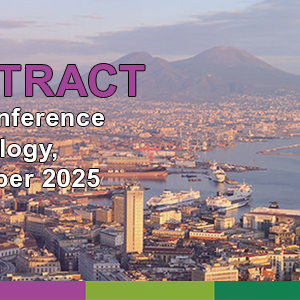
The RC33 Eleventh International Conference on Social Science Methodology will be held in Naples, Italy, from September 22nd to 25th, 2025, and will be hosted by the Department of Social Sciences at the University of Naples Federico II. As part of this event, Caterina Ambrosio (University of Naples Federico II), Paolo Landri (Cnr Iriss), and Luciana Taddei (Cnr Irpps) are organizing Session 8, titled Embracing Open Science: Methodological and Epistemological Challenges in Research Infrastructures for the Social Sciences.
This session focuses on digital research infrastructures, which represent a significant turning point in the field of social sciences, fostering a culture strongly oriented toward open science. While these infrastructures offer new opportunities for collecting, storing, sharing, and analyzing data – bringing numerous benefits to both research and society – they also present substantial methodological and epistemological challenges that researchers must address. Among these challenges are questions such as: How can we ensure data validity and representativeness? How do infrastructures influence research practices and our understanding of social phenomena? What are the best practices for data storage and management?
With this in mind, the panel seeks to provide space for a critical discussion on the opportunities and limitations of these infrastructures, contributing to the development of both practical guidelines and theoretical reflections for the future of social science research.
Scholars are invited to submit an abstract (maximum length: 300 words) by March 15th, 2025.
Per informazioni:
Paolo Landri
CNR – Istituto di Ricerca su Innovazione e Servizi per lo Sviluppo
paolo.landri@cnr.it
Vedi anche:
January 20th, 2025

In recent years, archaeology and heritage interpretation have increasingly emphasized the role of community engagement in exploring and narrating the past. Within the 31st European Association of Archaeologists Annual Meeting (Belgrade, 3-6 September 2025), Szilvia Fábián (Hungarian National Museum, National Institute of Archaeology), Marko Mele (Universalmuseum Joanneum), and Giuseppe Pace (National Research Council – Institute for Research on Innovation and Services for Development) have organized the session “Voices of the past, hands of the present. Collaborative pathways in archaeology and heritage interpretation”.
Drawing on insights from the Erasmus+ project “EMpowering landscapes with Participatory Approaches to Heritage interpretation Skills (EMPATHS),” this session invites participants to reflect on how archaeological practice can become more inclusive, embracing diverse community perspectives. By actively involving local voices in archaeological and interpretative processes, it is possible to co-create narratives that are more dynamic, representative, and impactful for broader audiences.
The session aims to explore innovative methodologies and frameworks for participatory archaeology, focusing on case studies where community involvement has enriched both archaeological practice and heritage interpretation. Key topics include the creation of shared narratives, collaborative decision-making, and approaches to bridge gaps between academic researchers and community knowledge holders.
Participants are also encouraged to discuss the complexities of balancing differing perspectives on heritage value, managing expectations, and addressing ethical considerations in collaborative work. Contributions are invited from archaeologists, heritage professionals, community leaders, and scholars interested in promoting inclusive practices and redefining heritage interpretation as a tool for dialogue, cultural identity, and community empowerment.
The call for contribution is open until February 6th, 2025, 23:59 CET.
More information:
– Contribution Format:Papers with 15-minute oral presentations.
– Submissions: Abstracts must be 150–300 words, and titles are limited to 20 words.
– Authorship: Each member may submit one paper and one poster as the main author, with no limits on co-authoring contributions.
Per informazioni:
Giuseppe Pace
CNR – Istituto di Ricerca su Innovazione e Servizi per lo Sviluppo
giuseppe.pace@cnr.it
Vedi anche:
January 9th, 2025
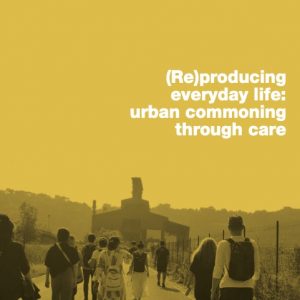
We are pleased to announce the release of the issue of Contesti (no. 1/2024) titled “(Re)producing everyday life: urban commoning through care” (Firenze University Press), edited by Chiara Belingardi (Lapei, University of Florence), Gabriella Esposito De Vita (Institute for Research on Innovation and Services for Development – Cnr Iriss), Stefania Ragozino (Cnr-Iriss), and Tihomir Viderman (BTU Cottbus-Senftenberg).
Drawing on innovative epistemological approaches, this issue delves into the intricate relationships between everyday life, urban commons, and care practices, highlighting how the dynamic and fluid nature of urban spaces intersects with the politics of communal living and collective care. In this context, the issue reflects on how capitalist forces and urban fragmentation exacerbate social inequalities, while also offering pathways for resistance and solidarity.
As cities become increasingly commodified and fragmented, this issue positions commons and care as fundamental pillars for reimagining urban spaces. Indeed, commons – as collective spaces and practices built through mutual care and shared responsibility – can provide a powerful counterpoint to the to the fragmentation of the everyday life, brought on by capitalist dynamics. The concept of commoning is explored as an ongoing process of negotiation, creation, and defense that binds urban spaces together, fostering solidarity in the face of systemic pressures. Special attention is given to how locally embedded care practices can disrupt power dynamics, reclaim urban spaces, and offer an alternative to the isolation fostered by capitalist systems. Through the lens of everyday life, the issue illustrates how small-scale, collective acts of care can resist fragmentation, challenge social inequalities, and transform urban environments.
The thematic framework of this issue is informed by discussions at the international conference “Urban Conflicts and Peace: Everyday Politics of Commons” (October 2023, Naples, Italy), organized by the Institute for research on innovation and services for development of the National Research Council of Italy (Cnr Iriss) and the AESOP Thematic Group “Public Spaces and Urban Cultures”. Drawing from these conversations, the issue presents diverse perspectives on how care and commons intersect, providing valuable insights into how cities might be reshaped through everyday acts of collective resistance.
The contributions collected in this issue highlight the need for collaborative, community-led approaches to urban design and governance, emphasizing the importance of solidarity, mutual aid, and care in the creation of just and inclusive cities. By engaging with these themes, the issues invites readers to reflect on the possibility of a future where urban spaces are not just sites of commodification but also places of care, cooperation, and collective action.
Per informazioni:
Stefania Ragozino
Cnr – Istituto di Ricerca su Innovazione e Servizi per lo Sviluppo
s.ragozino@iriss.cnr.it
Vedi anche:
December 20th, 2024